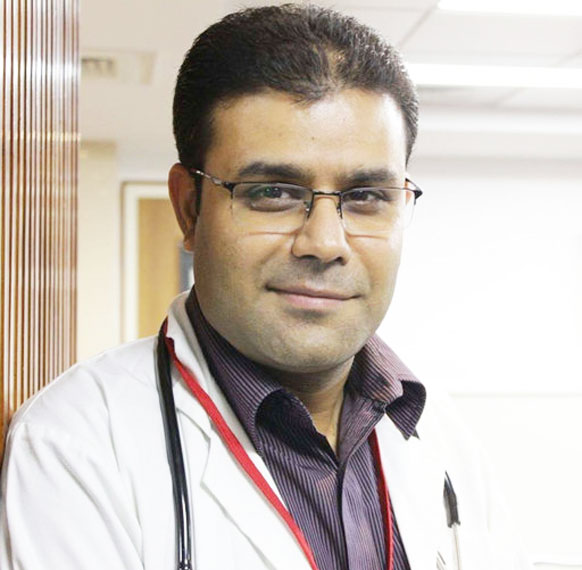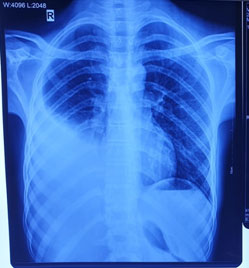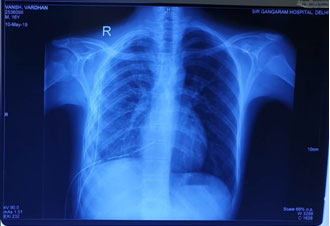CH Baktawar Singh Rd, Medicity, Islampur Colony, Sector 38, Gurugram, Haryana 122001


Empyema is a collection of pus in between the lung and chest wall formed by two pleural layers, visceral and pariteal.
It is caused by some infective process of the lung which leads to an accumulation of pus in the pleural space. The commonest cause of empyema in our country is Tuberculosis. It however can also be a complication of pneumonias, trauma with collection of blood inside the chest that gets infected. Repeated aspiration without asepsis of pleural fluids in cases of recurrent pleural effusion can also lead to infection of the fluid leading to empyema. Also empyema can happen after lung or chest surgery also.
The aim of the treatment in cases of empyema cure the infection with appropriate antimicrobial therapy, remove the infected pus and ensure complete expansion of the lungs with no residual space.
There are three stages of empyema:
The first stage of empyema is called simple empyema. It occurs when extra fluid begins to build up in the pleural cavity. This fluid can become infected and form pus. At this stage chest tube drainage along with antibiotics may cure the disease.
In complicated empyema, the fluid thickens and form jelly like material with loculations. This stage is best managed by clearance of the infected fluid using thoracoscopic / VATS drainage of empyema. In this method one to three small holes are made in the chest through which specialised instruments are insertedto break all the loculi under vision and removel of all infected pus and debris is carried out to expand the lung.
Finally, the infected fluid causes scarring of pleuraforming organised peel. This leads to what is called as trapped lung. At this stage surgery known as 360 degree decortication is what will cure the patient. It involves 5 major steps:
This surgery can be performed by two methods
1. VATS / Thoracoscopic Decortication- This is a minimally invasive method to do the surgery wherein one to three small (key-hole) incisions are made in the chest and the surgery is done without the need of cutting open the chest using a large incision. It allows faster recovery, lesser pain and better cosmesis to patients. About 95% of cases in our institute are done by VATS.
2. Open Decortication (Conventional) Surgery- For late cases who are not fit candidates for VATS / Thoracoscopy, open surgery may be required to rid the patient of the disease.

Pre operative X-Ray of Empyema

Post operative X-Ray after VATS decortication
People with respiratory infections or those with previous lung problems are the main populations affected by emphysema.
It frequently arises as a side effect of pneumonia, particularly in cases when the infection extends to the pleural area that surrounds the lungs.
Additionally, there is an increased chance of getting empyema in persons who have lung abscesses, TB, bronchiectasis, or are receiving chemotherapy.
Empyema susceptibility is increased by a few variables, such as ageing, smoking, alcohol misuse, and compromised immune systems from underlying diseases or medical treatments. Empyema is also more common in people with weakened immune networks, such as those with HIV/AIDS or those using immunosuppressive drugs.
In addition, children—especially those under five—are more vulnerable to empyema because of their immature immune systems and higher risk of respiratory infections. Occasionally, empyema can strike people who are otherwise healthy. This usually happens after a serious chest cavity trauma or surgery.
All ages can be affected by empyema, but people with compromised immune systems or underlying medical disorders are more susceptible to this dangerous consequence.
To effectively manage empyema and avoid complications, early symptom diagnosis and fast medical action are essential. Dr. Harsh Vardhan Puri offers thorough empyema treatment In Gurgaon, using cutting-edge methods customised to meet the needs of each patient. Thanks to his knowledge, patients get individualised treatment that effectively addresses their problems and encourages the best possible recovery.
Pus builds up in the pleural space around the lungs, a condition known as empyema. It usually develops as a side effect of respiratory illnesses, most frequently pneumonia. Inflammation and fluid buildup can result from bacteria or other infections that cause pneumonia spreading to the pleural space.
Empyema might develop from this fluid accumulation becoming contaminated. Leading thoracic surgery expert Dr. Harsh Vardhan Puri provides excellent empyema treatment in Gurgaon. By employing the latest innovations and minimally invasive techniques, he guarantees that patients have the most effective therapy for their ailments.
The following variables may make empyema more likely to develop:
In general, respiratory infections are the primary cause of empyema; however, some risk factors might make a person more susceptible to this illness, which highlights the need for early diagnosis and prevention.
Dr. Harsh Vardhan Puri's unmatched skill and commitment make him a standout practitioner of empyema treatment in Gurgaon. Dr. Puri's vast experience in thoracic operations, such as thoracoscopy and chest tube insertion, guarantees accurate diagnosis and efficient treatment of empyema. His patient-centric approach places a high value on individualised care, guaranteeing thorough treatment programmes catered to each patient's need.
For patients with empyema, Dr. Puri's dedication to excellence and the state-of-the-art resources at his disposal provide the best possible results. Selecting Dr. Harsh Vardhan Puri for empyema treatment in Gurgaon guarantees that you will have access to the best medical knowledge and caring assistance, which will promote a speedy recovery and enhanced quality of life.
The choice of antibiotics for empyema is influenced by several variables, including the infection's severity, the health status of the individual, and any underlying illnesses. Broad-spectrum antibiotics like amoxicillin-clavulanate, cephalosporins, or fluoroquinolones are frequently recommended for empyema.
Surgery may be required in cases when the empyema is extensive or does not improve with antibiotic treatment. Options for surgery include thoracentesis, which involves inserting a needle to drain the contaminated fluid, or thoracic surgery, which involves removing the affected tissue and draining the pleural area. Dr. Harsh Vardhan Puri provides expert empyema treatment in Gurgaon, including surgical options catered to the specific requirements of each patient.
Antibiotic medication and pleural space drainage of the contaminated fluid are the usual treatments for empyema. While drainage—either by thoracentesis or surgical procedures—removes the contaminated fluid and debris from the lungs, antibiotics aid in the elimination of the underlying infection. Dr. Harsh Vardhan Puri specializes in extensive empyema treatment in Gurgaon, treating empyema patients comprehensively and individually, ensuring that their condition is well-managed.
Even though empyema can be cured with effective therapy, recurrence is possible, particularly if underlying illnesses like pneumonia or abscesses in the lungs continue. It's critical to finish the whole course of antibiotic medication, have appropriate drainage operations, and keep up with routine medical examinations to watch for any indications of recurrence to lower the chance of recurrence.
Antibiotics and drainage techniques are used as the gold standard therapy for empyema. While drainage—either by thoracentesis or surgery by VATS—removes contaminated fluid and encourages lung re-expansion, antibiotics treat the underlying infection. In order to obtain the best possible results for his patients, Dr. Harsh Vardhan Puri uses evidence-based practices to provide skilled empyema treatment in Gurgaon.
The seriousness of the infection, how the individual responds to medication, and any previous health problems all affect how long an empyema patient needs to get treatment. Generally speaking, drainage operations may be continued as necessary until the illness is completely cured, and antibiotic medication may last for many weeks.